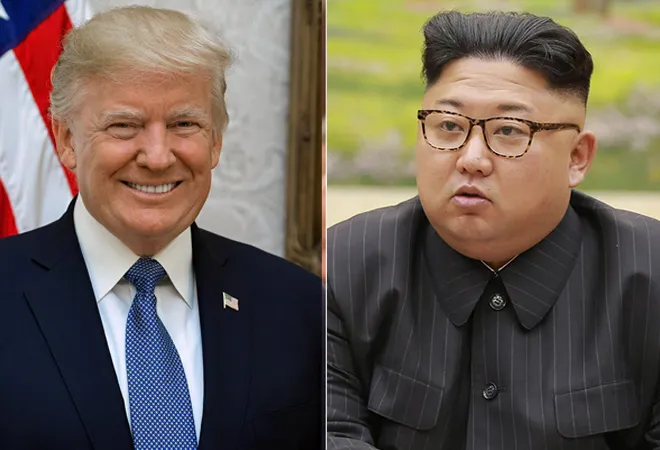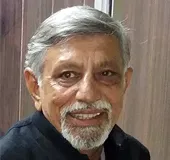-
CENTRES
Progammes & Centres
Location

Post the South Korean delegation’s interaction with North Korean leader Kim Jong Un and his suggesting a direct across the table dialogue with US President Donald Trump, intensive diplomatic lobbying commenced. The South Korean delegation called on the White House, where, as per reports, Trump ambushed them and led them to his office, where in minutes he agreed to meeting Kim Jong Un.
This action by Trump has surprised many, who continue to wonder, what the outcome would be. The South Koreans were themselves surprised as they had expected intense discussions prior to even obtaining an interaction with Trump. Trump may have visualised that if this bilateral summit succeeds, he would have achieved the impossible and along with it, international fame as being the only US President to have successfully dealt with North Korea. He even tweeted that if it does not proceed as per his thoughts, he could even walk away midway. Such an action would turn the situation extremely hostile.
Diplomatic summits at such levels are preceded by multiple contacts and diplomatic parleys to ensure that the right atmosphere is created, thus ensuring no failures. In this case, both are known mavericks, impulsive and spontaneous in behaviour. The Japanese Prime Minister, aware of the situation, is himself considering a direct summit with Kim Jong Un. Preparations are also underway for a direct North and South Korean dialogue in April. The US has no diplomatic contact with North Korea. It is reported that the speed of progress of North Korea’s weapons programme could threaten the US mainland in a brief time frame.
North Korea has been under a series of sanctions from the West, seeking to cripple its weapon programme. However, none of these seems to have succeeded.
It remains defiant as ever, threatening South Korea and Japan, known US allies. Its missiles under tests have flown close to the Japanese mainland adding to tensions. Attempts at pressurising China, supposedly a known ally, to force Kim Jong Un to change his stance, have drawn a blank. Thus, it emerged that the Chinese influence on the nation has waned. It appeared that North Korea was determined to continue with its nuclear development plans despite threats of military action by the US.
North Korea remains the most repressive regime on the planet. Kim Jong Un is witness to many dictators who questioned the power of the US but lacked nuclear weapons to ensure their survival. Gaddafi and Saddam Hussein are the two who were overthrown. They possessed no nuclear weapons to guarantee their survival. Gaddafi had admitted to receiving nuclear weapons designs and components through an international smuggling network, which he had handed over to the US in 2004, enhancing his vulnerability.
Kim Jong Un is aware that Iran having agreed to international monitoring of its nuclear weapon programme continues to face US sanctions for multiple reasons. Even the deal remains under threat since Trump assumed office. Thus, for Kim, survival implies possessing nuclear weapons, not may not for any direct assault, but to ensure survival of his regime. Even if he cannot reach mainland US, threatening South Korea, Japan and US bases in the Pacific are enough guarantee.
There are doubts on the level of development which North Korea has achieved thus far. Experts claim that the nation still does not possess the capability to threaten the US. Others have claimed that the country does not have the technology to mount nuclear weapons onto missiles. Thus, information available with the US, solely due to the nature of the closed regime, is sketchy, placing it at a disadvantage. The US may be clear on its ultimate aims, but lacking detailed inputs remains doubtful on how to reach the desired end state.
The sudden announcement of talks by North Korea, post its participation in the Winter Olympics as part of a joint Korean team, surprised the world. The North Korean Foreign Minister visited Sweden to interact with his counterpart, since they would most likely be the intermediaries. Sweden is also being considered as a likely venue for the talks.
There would be multiple reasons for North Korea to have suggested a summit, none of which appears to be linked to the impact of the sanctions.
First, it could be to announce to the world that it possesses nuclear weapons and should now be considered a nuclear power and treated as such. Thus, the world should guarantee the security of the regime even if it decides on curbing further testing. Second, it could be seeking to buy time to complete the development of its programme, including amalgamating the missile and the device, without any further testing. It has already proved it possesses the technology. Third, by sitting across the table with Trump, Kim Jong Un would have obtained legitimacy and status as a world leader who brought the US to discuss on his terms.
There are few aspects on which Kim Jong Un would never relent. Foremost would be dismantling his weapons and missiles. He knows that accepting such an agreement, despite any promises of aid and assistance made by Trump, would open doors for his removal in the years ahead. Second, opening his country for international agencies, either for aid or monitoring. His people are brutalised and have been taught to accept him as ‘God’. He would never let that change. Finally, opening his nuclear installations for international verification. North Korean nuclear installations are all based close to the Chinese border, thus ensuring that any attack on them would impact China the most. This ensures their security.
Presently, it does appear that North Korea holds all the cards, since the US remains concerned about the North’s missile programme. The US may seek a curb on fresh testing and development but may not be able to push for international monitoring.
It may have to promise security and sanctity of the regime, reduce deployment in South Korea and curtail anti-North exercises, but may never get the North to agree on dismantling its nuclear weapons. Thus, while peace may return to the region, the North would always possess the power to threaten.
President Trump has appointed John Bolton, a known critic of North Korea and one advocating bombing North Korea as his new National Security Advisor. Bolton has been advocating that North Korea hand over its components of nuclear programme to the US, like what Libya did in 2004. The Trump administration fails to realise that all nations do not jump to the US tune, least of all North Korea. If it moves forward with this intention, then its chances of success appear zilch from the start.
Trump may have accepted to commence dialogue with Kim Jong Un in haste. The US and its allies possess limited information on the true state of their nuclear programme. It may have its end state clear, but unless its inputs are updated, Kim Jong Un holds the cards. He walks in for the meeting fully prepared, demands clear, knowing he holds the cards.
The possibility of Trump walking out in frustration pushing all progress back is stronger than Kim Jong doing so. No matter what the outcome will be, Kim Jong Un would be the winner. It would be a meeting of two mavericks, either of which could throw a ner in the discussions, while nations under threat would remain on tenterhooks.
The views expressed above belong to the author(s). ORF research and analyses now available on Telegram! Click here to access our curated content — blogs, longforms and interviews.

An alumnus of the National Defence Academy Major General Harsha Kakar is a graduate of the DSSC LDMC and the National Securities Studies Course at ...
Read More +